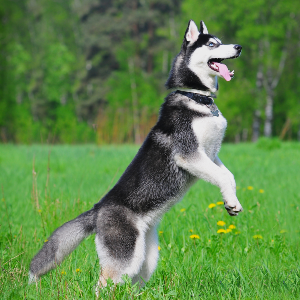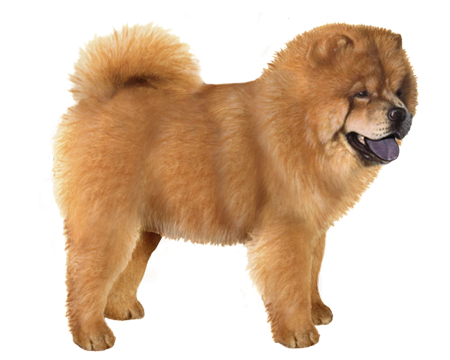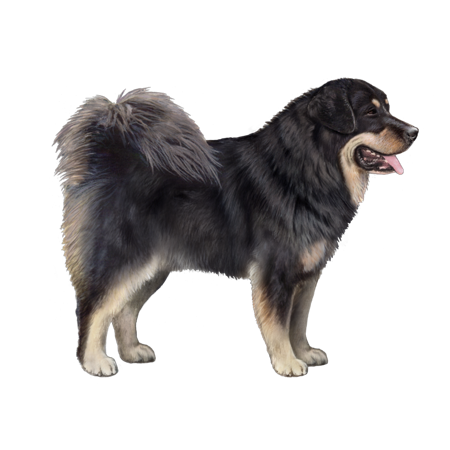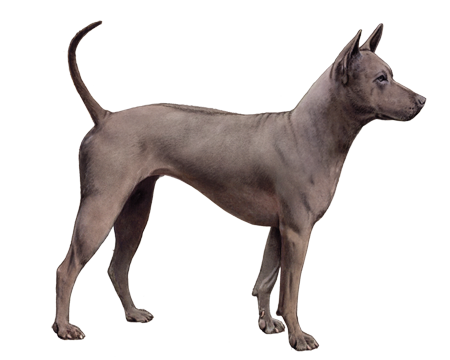
Siberian Husky
The Siberian Husky is a very intelligent breed that's active, alert, and gentle. Huskies show great ability in a range of activities and can adapt to different living environments. Their love of people and demeanor around children make Siberian Huskies wonderful pets and companions.
Interested in discovering if your dog is a Siberian Husky?
Check out Wisdom Panel's DNA tests.

Siberian Husky Traits
General Appearance
True to their northern heritage, Siberian Huskies have a compact body, erect ears, and a thick coat and tail. They are built for a combination of power, endurance, and speed.
Coat and Colouring
Siberian Huskies have a double coat—a soft, dense undercoat and a straight, somewhat smooth outer coat.
The breed standard permits any color, though the dog can be black, silver, or a variety of tans. These are generally shaded and mixed with white markings, leading to varied wolfish markings on the head and muzzle.
Distinctive Physical Traits
Siberian Huskies can have blue or amber eyes, and they sometimes have one of each color.
Medium, triangular-shaped ears sit high on their heads. They are thick, well-furred, and have slightly rounded tips that point straight up.
Huskies have bushy, fox brush-shaped tails that carry over their backs in a sickle curve when the dog is at attention.
Siberian Husky Temperament
Siberian Huskies are excellent with children and usually friendly to everyone, making them fantastic family dogs. However, this love of people means they are not natural guard dogs.
Because Siberian Huskies enjoy company so much, they should not be left alone for long periods. Otherwise, they may become destructive. Huskies are happiest when they're with their people—whether playing games in the backyard or going on outings with the family. And if it's cold and snowy outside, all the better!
This breed is typically good-natured and social towards other dogs but can be unpredictable with smaller pets. Huskies do also have the tendency to chase wildlife and, given the chance, would roam for hours. For these reasons, they should be in a fenced yard or on a leash when outdoors.


Siberian Husky History
The Siberian Husky is an ancient breed with a long history of helping mankind. Experts think the breed began with the Chukchi tribe of Siberia. When weather changes forced this semi-nomadic tribe to expand their hunting grounds, they needed a dog that could pull light loads long distances in sub-zero temperatures—without expending a lot of energy. The Siberian Husky was the result of those breeding efforts.
In addition to pulling sleds, the Siberian Husky has been given several jobs throughout history. These include herding reindeer, keeping children warm, and working as search and rescue dogs during World War II.
Siberian Huskies became famous in 1925 when they traveled 658 miles in less than six days to deliver diphtheria serum after the city of Nome, Alaska, was stricken by an epidemic. The Iditarod dog sled race commemorates this feat. Huskies also transported various other medications to the ill.
The Siberian Husky came to America in 1909, and the popularity of the breed has grown significantly ever since. It's now one of the most popular Arctic breeds.
The AKC did not recognize the Siberian Husky until 1930—the same year the Soviet government stopped the exportation of the breed by closing the borders of Siberia to external trade.
Siberian Husky Care
Nutrition
To meet their nutritional needs, you should feed Siberian Huskies a high-quality food that's appropriate for their life stage (e.g., puppy, adult, or senior).
For the working Siberian Husky, you should adjust diets seasonally: increase protein during the winter months when they're pulling sleds, and decrease it in the summer when they're not as active.
Because of their thick coats, it can be difficult to visually assess a Siberian Husky's body condition. To get a more accurate understanding, use your hands to feel along their rib cage. When at an appropriate weight, you should be able to easily feel the ribs. If you notice any weight gain, restrict calories until they return to an ideal weight.
Grooming
Siberian Huskies are naturally clean dogs that don't require frequent bathing. Most of the year, brushing their coat once or twice a week will help keep it clean and healthy.
Twice a year, they will shed their undercoat. During these periods, more frequent brushing with a pin brush or metal comb will help remove the old coat. You can trim fur around the feet and toes to keep paws clean and tidy, but no other fur on the body should be trimmed.
A Siberian Husky's nails need to be cut regularly. Nails that get overly long can cause pain and potentially lead to problems running or walking.
Like all dog breeds, Siberian Huskies require regular dental care, including at-home teeth brushing and professional dental cleanings. Maintaining good dental hygiene is important for their overall long-term health, and the sooner you get them into a good dental care routine, the better.
Exercise
To be happy, Siberian Huskies need lots of attention and physical exercise. They enjoy participating in dog sports such as sledding, skijoring (pulling a skier), and carting. You can also take them on daily long walks or, even better, long jogs.
When adequately exercised, Siberian Huskies are typically calm housemates. However, if they don't get enough physical activity they may turn to digging, chewing, or other undesirable behaviors.
Training
Siberian Huskies are quite independent. So you should start training— firmly, consistently, and gently—from an early age. Reward-based training using small treats and favorite toys can help mitigate their stubborn tendencies.
Obedience training will also provide them with much-needed mental exercise.

Siberian Husky Genetic Health Conditions
-
X-Linked Progressive Retinal Atrophy 1
X-Linked Progressive Retinal Atrophy 1 (XLPRA1) causes degeneration of the light detecting retina at the back of the eye, resulting in loss of vision.
Knowing if your Siberian Husky is a carrier or at-risk for these conditions can help you and your veterinarian plan for your pup's lifelong care. With Wisdom Panel™ Premium, you can get results for over 200 genetic health tests.
Breed Group
Asian and Oceanian
The Asian and Oceanian group is comprised of breeds whose origins lie in Asia, which have spread as far as Australia, the islands of the Pacific, and the Arctic. This group is possibly the most ancient of all breed groups and were bred for a variety of purposes, including guarding, hunting, and as draft dogs.












































